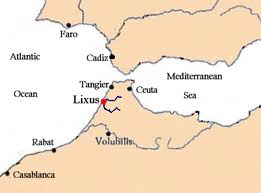Bergman, Jonas
Jonas Bergman is a Swedish Atlantologist living in Uppsala, who actively promotes his theory that Plato’s Atlantis was located in Morocco (PAiM). His  excellent website(a) concentrates on matching the topography of Morocco with Plato’s description, together with a detailed re-appraisal of Plato’s original text.
excellent website(a) concentrates on matching the topography of Morocco with Plato’s description, together with a detailed re-appraisal of Plato’s original text.
He presented a paper at the 2005 Atlantis Conference on Melos in which he outlined the evidence for linking Atlantis with the Phoenicians, in particular their western colonies. Bergman contends that although Plato never applied the Greek word for continent, epiros, to Atlantis. his statement that Atlantis was greater than Asia and Libya combined was a reference to its size rather than its military might. Bergman supports his contention with a quotation from Strabo (Geography 2.3.6) who employs the term epiros in a similar manner.
Although he originally favoured the ancient city of Lixus on the Atlantic coast of Morocco, Bergman later modified his views and has now opted for Chellah (sometimes Salah or Shelah), a site on the river Bou Regreg near the Moroccan capital, Rabat.
Bergman also presented a paper to the 2008 Atlantis Conference in which he quoted from fourteen classical authors a “range of parallels between Plato’s primeval Athenians and those of the Heroic tradition. The idea that Plato invented the whole thing seems highly unlikely.” [0750.103]
Some years ago, Georgeos Díaz-Montexano published a paper(b)(c) on the now-defunct AtlantisRising.com website in which he strongly criticised Bergman’s identification of Chellah with the Phoenician city of Sal? and by extension with the city of Atlantis.
In December 2016, Bergman published the first of a series of Kindle books with the title of The Foundations of Plato’s Atlantic Tale [1395]. In it he focuses on the credibility of Plato’s account and some of the apparent contradictions in the text. This is a short 36-page offering and in my opinion, is somewhat overpriced.
(a) https://www.paim.net/morocco/ (offline Sept.2016)
(b) http://desdelavegard.blogspot.com/2011/05/el-nombre-original-de-atlantis-ispalis.html (Span)
(c) Archive 6379
